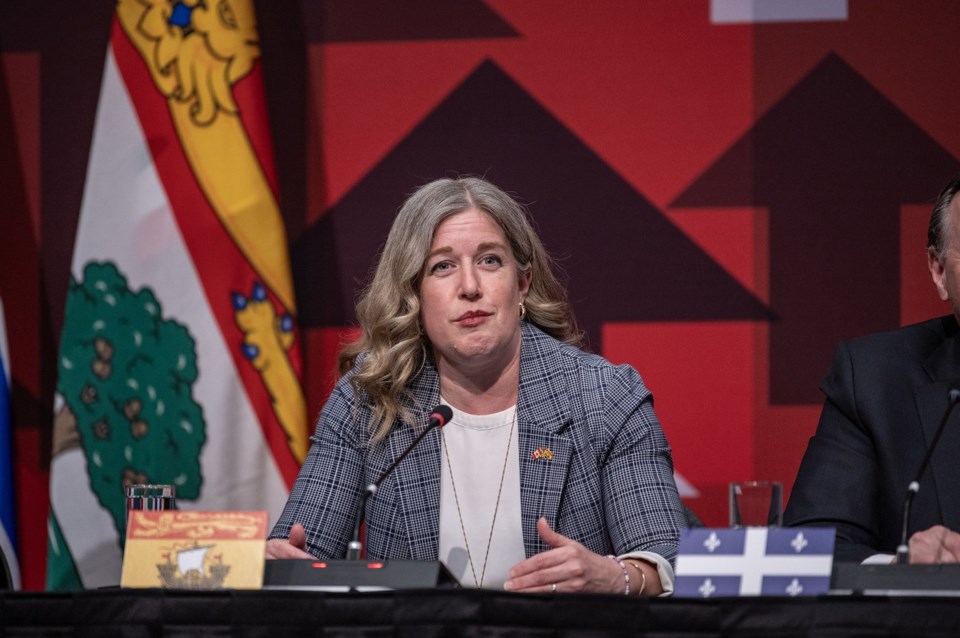FREDERICTON — A group of Canadian premiers appears to be setting high expectations as they pursue negotiations with American governors to mitigate the impacts of United States-imposed tariffs on their economies.
Premiers from New Brunswick, Nova Scotia, Prince Edward Island, Newfoundland and Labrador, Ontario, and Quebec's economic minister are scheduled to meet with New England governors on Monday in Boston.
New Brunswick Premier Susan Holt said the premiers are looking to the New England governors for insights on how to deal with the White House and U.S. President Donald Trump.
"I mean, ideally, what we would get is every governor ... agreeing to articulate in loud and formal terms their objection to the tariffs to their administration," Holt told reporters Thursday.
"If we can get everyone agreeing that the tariffs are negatively impacting Americans and passing that message on to the White House, that would be a win."
Holt also said she plans on raising "critical" energy and infrastructure files.
Massachusetts Gov. Maura Healey said last month that the leaders hope to discuss how they can work together and maintain economic relationships in the face of Trump's tariffs.
"Canada is Massachusetts’ No. 1 trading partner," she said in a May 5 news release.
"For generations, we have enjoyed a strong partnership and a healthy exchange of energy, lumber, dairy, cars and car parts, seafood and more. Our businesses and our residents all benefit from this relationship. But President Trump’s tariffs are undermining this partnership, making it harder for businesses to keep their doors open, and increasing the cost of everything that the New England and Canadian people rely on."
Joseph Steinberg, a professor at University of Toronto's economics department, said domestic U.S. pressure, particularly from Republican states, is more effective in influencing Trump's tariff policies than international retaliation.
"I think what matters most is the pushback that the president hears from leaders within the United States," Steinberg said. "The more of that pushback there is, and the more he hears that American household and American firms are hurting — that is the most effective thing to get him to change his tariff policy."
He added that it would be a good thing to keep the lines of communication open between the premiers and the governors.
"The U.S. is one of the biggest economies in the world, and it's right next door. So technologically and geographically, the United States is always going to be our biggest trade partner. There's no way to get around that."
Holt said New Brunswick supplies a lot of energy products to New England.
“I think 90 per cent of the cars in Boston are driving with gas that comes from the Irving refinery and us. They are keen to make sure we will continue to be a reliable supplier of energy to them," she said.
"We see the U.S. as a market to sell energy in a way that is profitable and beneficial to New Brunswick.”
Healey said an analysis showed that tariffs on Canadian energy would raise gas and heating oil prices by over 30 cents a gallon and could cost nearly $1.4 billion a year for people in Massachusetts, and $3.4 billion for those in the New England area.
Ontario is also looking to discuss energy and minerals with the U.S., said Grace Lee, spokeswoman for Premier Doug Ford.
“Ontario is proud to have one of the cleanest and most reliable energy grids, alongside mineral rich areas ready for development and a highly skilled workforce that the U.S. needs and relies on," she said in a statement.
"Premier Ford will advocate for his vision of Fortress Am-Can, a renewed strategic alliance that makes Canada and the U.S. the richest, most prosperous, safest and most secure two countries on the planet.”
Prince Edward Island Premier Rob Lantz's office did not respond to a request for comment.
Léa Fortin, spokeswoman for Quebec's economic minister Christopher Skeete, said the meeting is a chance to reiterate ties between Quebec and the United States, as well as the Atlantic provinces.
Sonja Pomeroy, spokeswoman for Premier John Hogan said Newfoundland and Labrador exported approximately $4.5 billion of goods to the United States in 2023, representing 37 per cent of the province’s total exports.
For example, she said in any given year, 60 to 80 per cent of Newfoundland and Labrador's seafood exports go to the United States.
So the meeting is an opportunity to reinforce the social and economic value of Canada’s long relationship with the United States, she explained.
"Barriers to trade are bad for both national economies," Pomeroy said.
Maine Gov. Janet Mills said Canadian provinces and her state have enjoyed strong relationships over generations because of shared economies and cultures. But these are now strained from Trump's "haphazard tariffs and harmful rhetoric targeting our northern neighbours," she said in the May 5 statement.
Nova Scotia Premier Tim Houston acknowledged Canadian provinces don't have the power to resolve trade issues on their own.
"But that doesn't mean we can't have a positive relationship with governors and Americans in general," Houston said. "I think that's the goal."
This report by The Canadian Press was first published June 13, 2025.
Hina Alam, The Canadian Press



